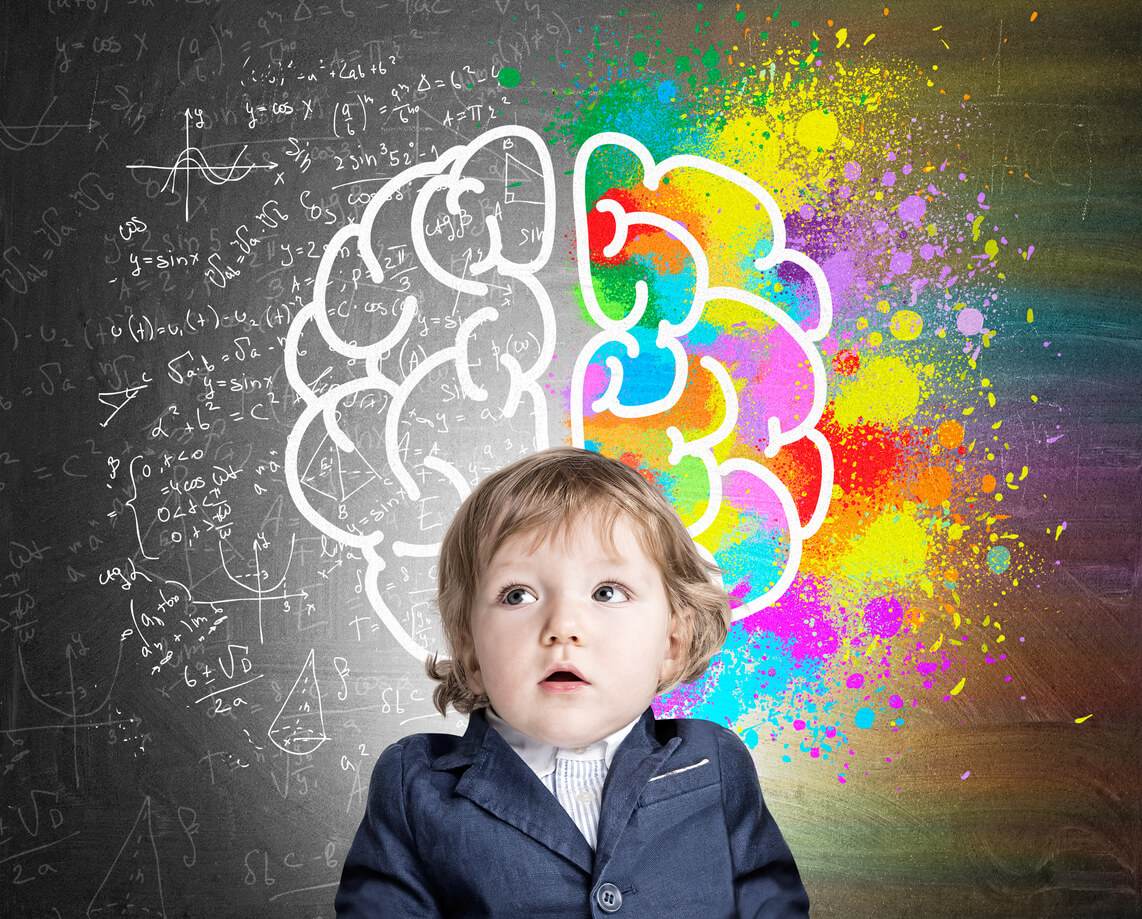11 Signs of High Intellectual Abilities in Children

Behaviors that you don’t know how to interpret: Distraction, difficulty concentrating, boredom? Confusing diagnoses: Attention deficit hyperactivity disorder (ADHD) or high intellectual abilities in children? The result is always the same: Parents who don’t know what’s going on with their child and how to help them.
To find the answer, we need to have the guidance and evaluation of a professional. However, today we’re going to tell you what the signs that indicate high intellectual abilities in children are.
What are high intellectual abilities in children?

The definition of intelligence has always been quite complex. Even more so when we refer to such a specific phenomenon as high intellectual abilities (HIA).
The case of HIA defines an above-average intelligence (approximately 10%) in one or more domains or skills.
Specialists in the field define the domains as structured activities (such as mathematics) or sensorimotor skills (such as painting or sports). In this sense, it’s worth clarifying that HIA doesn’t necessarily imply good academic performance.
The importance of having an early diagnosis of this condition lies in the possibility of orienting teaching strategies and accompanying parenting according to the demands of these children. Otherwise, the situation can end up overcoming anyone and cause enormous frustration and anguish for the child and their family.
Therefore, knowing and understanding what happens with these children helps to regain the balance and peace of mind necessary to enjoy a full life.
11 signs of high abilities in children and babies
We can summarize that children with high abilities are characterized by achieving their evolutionary milestones earlier than their peers. However, the accurate diagnosis of this condition requires the performance of different studies.
Some of the indicators that allow us to realize that a child has HIA are the following:
- They’re babies and children who have a hard time sleeping. They don’t seem to need it, as they’re never tired.
- Nothing seems to be enough for them. They need to move, explore, wonder, ask questions. They’re always active.
- Already in the first months, their gaze is attentive, as if penetrating, they seem to be absorbed in what they see.
- They’re easily excited and activated by toys in the crib or in the car.
- They’re able to remember particular places, people, and sounds.
- They learn words at an early age, which also facilitates the acquisition of writing and reading skills. For example, they’re able to carry on a conversation at one year of age and by the time they start school, they’re ahead of their peers, and many can even read and write.
- They’re interested in letters and numbers from a very early age. This learning can even be self-taught.
- In terms of social skills, in some cases, they’re capable of behaving as leaders. But others tend to isolate themselves, as emotional maturity doesn’t necessarily develop at the same time as cognitive maturity.
- They’re restless babies, who quickly learn to crawl and walk and show early motor skills.
- They’re usually very sensitive to smells, noises, and tastes. They’re also very emotional. They’re interested in social, philosophical, and complex topics from an early age.
- They tend to work on their own, without much help from adults. Problems, for them, often represent new challenges.

What to do when faced with signs of high intellectual abilities in babies
When we become parents, we’re faced with challenging situations, about which we don’t always know. Even situations that aren’t always present in every family and about which we can’t ask for advice.
When your child seems “endless” and isn’t content with anything, you’re sure to feel distressed at times. At first, many people will believe that it’s a phase or that the child is very demanding. With time and with the consultation of different specialists, the diagnosis of ADHD may come. Various treatments will begin, sometimes medication, and nevertheless, the changes won’t advance in the desired direction.
Therefore, it’s important that, when in doubt, parents make an interconsultation until they find the appropriate answer that explains what they observe at home. Parents are the ones who can best guide the professionals about what they see and experience on a daily basis. In this way, it’ll be easier to understand and build the case.
Why is it valuable to have a diagnosis of certainty? Because this allows professionals to provide appropriate care, as well as to better accompany and contain children and their families.
A relevant diagnosis avoids frustration, discomfort, and boredom in children. It makes it possible to adapt educational strategies and accompany their school career. It also prevents turning all the potential these children have into a problem. In short, it helps them to enjoy a full life, as they deserve.
Behaviors that you don’t know how to interpret: Distraction, difficulty concentrating, boredom? Confusing diagnoses: Attention deficit hyperactivity disorder (ADHD) or high intellectual abilities in children? The result is always the same: Parents who don’t know what’s going on with their child and how to help them.
To find the answer, we need to have the guidance and evaluation of a professional. However, today we’re going to tell you what the signs that indicate high intellectual abilities in children are.
What are high intellectual abilities in children?

The definition of intelligence has always been quite complex. Even more so when we refer to such a specific phenomenon as high intellectual abilities (HIA).
The case of HIA defines an above-average intelligence (approximately 10%) in one or more domains or skills.
Specialists in the field define the domains as structured activities (such as mathematics) or sensorimotor skills (such as painting or sports). In this sense, it’s worth clarifying that HIA doesn’t necessarily imply good academic performance.
The importance of having an early diagnosis of this condition lies in the possibility of orienting teaching strategies and accompanying parenting according to the demands of these children. Otherwise, the situation can end up overcoming anyone and cause enormous frustration and anguish for the child and their family.
Therefore, knowing and understanding what happens with these children helps to regain the balance and peace of mind necessary to enjoy a full life.
11 signs of high abilities in children and babies
We can summarize that children with high abilities are characterized by achieving their evolutionary milestones earlier than their peers. However, the accurate diagnosis of this condition requires the performance of different studies.
Some of the indicators that allow us to realize that a child has HIA are the following:
- They’re babies and children who have a hard time sleeping. They don’t seem to need it, as they’re never tired.
- Nothing seems to be enough for them. They need to move, explore, wonder, ask questions. They’re always active.
- Already in the first months, their gaze is attentive, as if penetrating, they seem to be absorbed in what they see.
- They’re easily excited and activated by toys in the crib or in the car.
- They’re able to remember particular places, people, and sounds.
- They learn words at an early age, which also facilitates the acquisition of writing and reading skills. For example, they’re able to carry on a conversation at one year of age and by the time they start school, they’re ahead of their peers, and many can even read and write.
- They’re interested in letters and numbers from a very early age. This learning can even be self-taught.
- In terms of social skills, in some cases, they’re capable of behaving as leaders. But others tend to isolate themselves, as emotional maturity doesn’t necessarily develop at the same time as cognitive maturity.
- They’re restless babies, who quickly learn to crawl and walk and show early motor skills.
- They’re usually very sensitive to smells, noises, and tastes. They’re also very emotional. They’re interested in social, philosophical, and complex topics from an early age.
- They tend to work on their own, without much help from adults. Problems, for them, often represent new challenges.

What to do when faced with signs of high intellectual abilities in babies
When we become parents, we’re faced with challenging situations, about which we don’t always know. Even situations that aren’t always present in every family and about which we can’t ask for advice.
When your child seems “endless” and isn’t content with anything, you’re sure to feel distressed at times. At first, many people will believe that it’s a phase or that the child is very demanding. With time and with the consultation of different specialists, the diagnosis of ADHD may come. Various treatments will begin, sometimes medication, and nevertheless, the changes won’t advance in the desired direction.
Therefore, it’s important that, when in doubt, parents make an interconsultation until they find the appropriate answer that explains what they observe at home. Parents are the ones who can best guide the professionals about what they see and experience on a daily basis. In this way, it’ll be easier to understand and build the case.
Why is it valuable to have a diagnosis of certainty? Because this allows professionals to provide appropriate care, as well as to better accompany and contain children and their families.
A relevant diagnosis avoids frustration, discomfort, and boredom in children. It makes it possible to adapt educational strategies and accompany their school career. It also prevents turning all the potential these children have into a problem. In short, it helps them to enjoy a full life, as they deserve.
All cited sources were thoroughly reviewed by our team to ensure their quality, reliability, currency, and validity. The bibliography of this article was considered reliable and of academic or scientific accuracy.
- García-Ron, Adrián & Sierra-Vázquez, José. (2011). Niños con altas capacidades intelectuales. Signos de alarma, perfil neuropsicológico y sus dificultades académicas. Anales de Pediatría Continuada. 9. 69–72. 10.1016/S1696-2818(11)70010-5. Disponible en: https://www.elsevier.es/es-revista-anales-pediatria-continuada-51-articulo-ninos-con-altas-capacidades-intelectuales–S1696281811700105
- Gómez-León, M. I. (2019). Psicobiología de las altas capacidades intelectuales. Una revisión actualizada. Psiquiatría biológica, 26(3), 105-112. Disponible en: https://www.elsevier.es/es-revista-psiquiatria-biologica-46-articulo-psicobiologia-altas-capacidades-intelectuales-una-S1134593419300430
- Higueras-Rodríguez, L., & Gálvez, J. D. D. F. (2017). El papel de la familia en la educación de los niños con altas capacidades intelectuales. IJERI: International Journal of Educational Research and Innovation, (7), 149-163.
- Irueste, P., Arsaut, C., & Benavidez, M. (2019). ANÁLISIS DE LA RELACIÓN ENTRE LAS ALTAS CAPACIDADES INTELECTUALES Y LA INTELIGENCIA EMOCIONAL EN NIÑOS Y NIÑAS DE 8 A 10 AÑOS DE LA CIUDAD DE CÓRDOBA, ARGENTINA ANALYSIS OF THE RELATIONSHIP BETWEEN THE HIGH INTELLECTUAL CAPACITIES AND THE EMOTIONAL INTELL. Revista Sudamericana De Educación, Universidad Y Sociedad, 7(1), 15-26. https://doi.org/10.48163/rseus.2019.7115-26
This text is provided for informational purposes only and does not replace consultation with a professional. If in doubt, consult your specialist.








